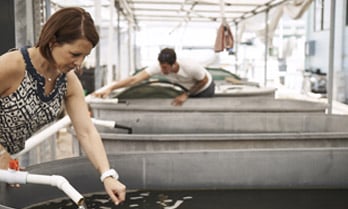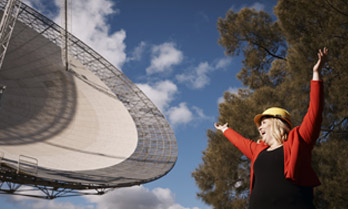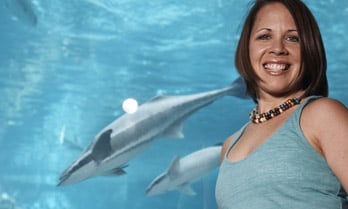Dr Christina Riesselman, geologist, University of Otago, Dunedin
01 September 2015
When the oceans were 20 metres higher: revealing past and future climates
Three million years ago Earth was much as it is today – familiar continents, animals, and carbon dioxide levels. But temperatures were higher and sea levels were also about 20 metres higher. Today, a billion people live on land less than 20 metres above sea level, and carbon dioxide levels are rising.
Working on the Antarctic ice shelf and at sea Dr Christina Riesselman collects sediment cores from hundreds of metres under the sea floor and reads the climate history of millennia past using the microscopic fossilised fish teeth and diatomic algae she finds in the cores.
Christina will use her L’Oréal-UNESCO For Women in Science Fellowship to turn her focus to the end of the last Ice Age around 10,000 years ago. 2014 was the hottest year on record, but was it the hottest year since the end of the last ice age? Christina’s research could answer that question and help us understand and plan for the impact of our planet’s rapidly changing climate.
Qualifications
| 2011 | PhD (geological and environmental sciences), Stanford University, USA |
| 2001 | Bachelor of Arts (English and geology), University of Nebraska-Lincoln, USA |
Career highlights, awards, fellowships, grants
| 2015 | Korea Polar Research Institute sediment coring expedition (ANA05B), Ross Sea, Antarctica |
| 2015 | Project leader for Ministry of Business, Innovation and Employment funded Past Antarctic Climate programme |
| 2015 | Co-principal Investigator, New Zealand Antarctic Research Institute grant |
| 2014 | Organiser and facilitator, Dual Careers in Academia panel and workshop for early career scientists, Goldschmidt2014, Sacramento, USA |
| 2013 | Principal Investigator, Royal Society of New Zealand Marsden Fund, Windows onto warmer worlds: Sea ice, nutrient utilization, and primary production on the Wilkes Land margin, Antarctica |
| 2013 | TRACERS modern process cruise (NBP13-02), Ross Sea, Antarctica |
| 2014 | Invited contributor, A multiproxy approach to the reconstruction of Pliocene climate workshop, Barcelona, Spain |
| 2013 | Invited presentation, Geological Society of Washington, Cosmos Club, Washington DC, USA |
| 2011–2013 | Mendenhall Postdoctoral Fellowship, U.S. Geological Survey |
| 2011 | Invited presentation, International Symposium on the Antarctic Earth Sciences, Edinburgh, UK |
| 2011 | Invited presentation, University School of Earth and Environment, Earth Surface Science Institute, Leeds, UK |
| 2012 | Invited presentation, American Geophysical Union, San Francisco, USA |
| 2005 | ARCS Foundation Fellowship |
| 2007 | ANDRILL Southern McMurdo Sound project, McMurdo Station, Antarctica |
| 2007-2009 | Graduate Research Fellowship, ANDRILL |
| 2002 | Antarctic expedition, AntarcticaNZ/ANDRILL site survey, Ross Ice Shelf, Antarctica |
| 2001 | Chancellor’s Scholar, University of Nebraska, USA |
Top five publications
Riesselman CR, Dunbar RB (2013) Diatom evidence for the onset of Pliocene cooling from AND-1B, McMurdo Sound, Antarctica, Palaeogeography, Palaeoclimatology, Palaeoecology 369:136–153. (Impact factor 3.035, 2 citations)
McKay R, Naish T, Carter L, Riesselman C, Sjunneskog C, Winter D, Dunbar R, Sangiorgi F, Warren C, Pagani M, Schouten S, Willmott V, Levy R, DeConto R, Powell R (2012) Antarctic and Southern Ocean influences in global Late Pliocene cooling, Proceedings of the National Academy of Sciences 109(17): 6423–6428. (Impact factor 10.727, 29 citations)
Dowsett HJ, Robinson MM, Haywood AM, Hill DJ, Dolan AM, Stoll DK, Chan W-L, Abe-Ouchi A, Chandler MA, Rosenbloom NA, Otto-Bliesner BL, Braggs FJ, Lunt DJ, Foley KM, Riesselman CR (2012) Assessing confidence in Pliocene sea surface temperatures to evaluate predictive models, Nature Climate Change 2:365–371. (Impact factor 15.327, 41 citations)
Cook CP, van de Flierdt T, Williams T, Hemming SR, Iwai M, Kobayashi M, Jimenez-Espejo FJ, Escutia C, González JJ, Khim B-K, McKay RM, Passchier S, Bohaty SM, Riesselman CR, Tauxe L, Sugisaki S, Galindo AL, Patterson MO, Sangiorgi F, Pierce EL, Brinkhuis H, IODP Expedition 318 Scientists (2013) Dynamic behaviour of the East Antarctic Ice Sheet during Pliocene warmth, Nature Geoscience 6:765–769. (Impact factor 13.93, 19 citations)
Tortell PD, Payne CD, Li Y, Trimborn S, Rost B, Smith W, Riesselman C, Dunbar R, Sedwick P, DiTullio G (2008) Response of Southern Ocean phytoplankton to CO2, Geophysical Research Letters 35:L04605. (Impact factor 4.41, 81 citations)




